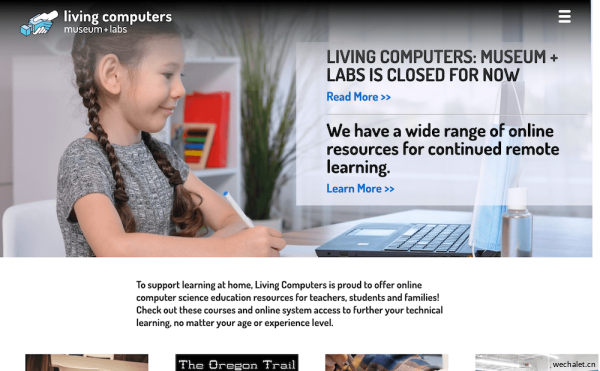LivingComputers - Seattle Museum+Laboratory
Country: America Type: network
Tag: Computer Science Collectibles Laboratory
English Websites: https://www.livingcomputers.org/ Enter The Website
LivingComputers: A museum and laboratory in Seattle showcasing a range of machines refurbished by a team of professional engineers for interactive use by visitors.
To support home learning, Living Computers is proud to provide online computer science education resources for teachers, students, and families!

From an online computer to the world's largest collection of historical operational computers
It all started with a computer. In 1997, Paul Allen's company Vulcan Inc. purchased the TOAD-1 system from the engineering company XKL Systems Corporation (now XKL LLC) located in Redmond, Washington. Mr. Allen was interested in preserving the historically significant software created on the Digital Equipment Corporation (DEC) PDP-10 series system, which later became known as DECsystem-10 and DECSYS-20, and created TOAD-1, PDP-10 clones for public use.
DECSYS-1090 and DECSYS-2065 from XKL, as well as a large number of various DEC PDP computers, quickly followed one after another. In 2006, we opened remote accounts for some of these machines to the public through the PDPPlanet.com website.
After expanding its collection beyond DEC, the museum opened its collection of vintage computers to the public in 2012 for viewing and use as a living computer museum. In 2016, the museum expanded by adding exhibits showcasing current technology on the first floor and three hands-on computer science learning laboratories. Then it was named Living Computers: Museum+Labs.
LCM+L continues to collect and restore historically significant computers and software. Machines should be used on-site as much as possible, and many machines can be used remotely.
At Living Computers: Museum+Labs, we empower people through the active use of computing technology. Most museums put glass in front of their things - we put a chair.
Our philosophy is simple. To understand computing technology, you need to experience it firsthand. The best way to experience a computer is to use it.
Living Computers was originally founded by Paul G. Allen (1953-2018) and now operates as a 501 (C) 3 non-profit charitable organization.
In the four years since co founding Microsoft, entrepreneur and philanthropist Paul G. Allen continued to explore the frontiers of technology and human knowledge, and took action to change the future.
Through his company Vulcan Inc., Paul is committed to saving endangered species, mitigating climate change, improving ocean health, sharing art, history, and film, developing new technologies, addressing epidemics, researching the workings of the human brain, and building sustainable communities. In all his efforts, Mr. Allen kept asking 'What if...?' and pushing people to challenge traditional thinking, collaborate across disciplines, and reimagine possible things.
Paul made local investments in his hometown of Seattle and the Pacific Northwest, and created public spaces including the Flight Heritage and Combat Armor Museum, MoPOP, and the Living Computer Museum+Laboratory - where people learn about and interact with Seattle's history, culture, and music heritage.
The Seattle Art Fair and Upstream Music Festival+Summit have made this city one of the top art and music destinations in the United States. Diversified economy.
Many of his careers were broadcasted when he was young, reflecting the depth and diversity of his passion. He strives to create a new future - a future that depicts the complexity of our minds, ignites hidden talents, and subverts traditional thinking.
If we can understand the mysterious organ of the brain, we can pave the way for understanding diseases such as Alzheimer's. If we can change the economy of space launch, we can change space travel and exploration. If we can develop the correct formula for the new city center community, it will become a guide for future innovation centers. Paul is committed to sharing his ideas and discoveries with the world to help promote a better future.
Related Suggestion
Wuyuan Development Platform
Enhancer is a professional one -stop information s...
Reading: 58 2024-11-17
University of London (UCL)
UCL refers to the University College London of Lon...
Reading: 29 2024-11-17
Pharos -International Picture Archives Federation
PHAROS is an international consortium of 14 Europ...
Reading: 33 2024-11-17
Language Lab Software | (SchoolShape)
SchoolShape Language Laboratory is a cloud -based...
Reading: 27 2024-11-17
Song meaning and lyrics explanation | lyreka
Discovery and discuss the meaning of the song and...
Reading: 47 2024-11-17




